Overview
To develop an entrepreneurial mindset, individuals should focus on cultivating essential skills such as initiative, critical thinking, and adaptability, along with goal-setting and resilience. The article emphasizes that these steps are crucial for navigating career transitions and overcoming challenges in a rapidly changing job market, supported by evidence that highlights the importance of proactive learning and networking in achieving personal and professional success.
Introduction
In a world where career paths are increasingly unpredictable, cultivating an entrepreneurial mindset has become essential for those navigating transitions. This mindset, characterized by innovation, resilience, and a proactive approach, empowers individuals to tackle challenges head-on and seize opportunities in a rapidly evolving job market.
With the rise of solopreneurs and the growing emphasis on adaptability, understanding the core principles of entrepreneurship can significantly enhance one’s career trajectory. As traditional employment landscapes shift, embracing the entrepreneurial spirit not only fosters personal growth but also equips individuals with the skills necessary to thrive in diverse industries.
This article delves into the key components of an entrepreneurial mindset, providing practical insights into:
- Essential skills
- Goal-setting
- Resilience
- The vital role of networking in achieving success during career transitions.
Defining the Entrepreneurial Mindset
The entrepreneurial perspective embodies a distinctive way of thinking that champions innovation, risk-taking, and resilience, as outlined in ‘Your Profession 2.0: A Survival Guide for The Battered Employment Syndrome and Investor Syndrome.’ This perspective is defined by crucial attributes like creativity, proactivity, and a willingness to learn from experiences—qualities invaluable for anyone aiming to improve their professional or personal development. Adopting this perspective is especially crucial for people navigating career transitions, particularly those impacted by the Battered Career Syndrome and Investor Syndrome, as it promotes a proactive approach to both challenges and opportunities.
Recent statistics reveal that:
- The average entrepreneur starts two businesses.
- 76% of solopreneurs work remotely at least some of the time.
- 52% express a desire to be their own boss.
As highlighted by Janine Gregor, a VA Matchmaker, these stats are not just numbers; they represent a shift in how we think about work and ownership. This trend highlights the increasing importance of an entrepreneurial attitude across different sectors, particularly in rapidly changing industries such as healthcare, technology, and e-commerce, which are expected to flourish in 2024.
However, entrepreneurs also face numerous challenges, such as finding quality employees and attracting new customers, making running a business often more stressful than raising children. By participating in a personalized coaching experience, people can clarify their entrepreneurial goals and overcome these challenges more effectively. Understanding and adopting the steps to developing an entrepreneurial mindset can enable people to tackle the complexities of career shifts, fostering a culture of resilience and adaptability that is essential in today’s dynamic work environment.
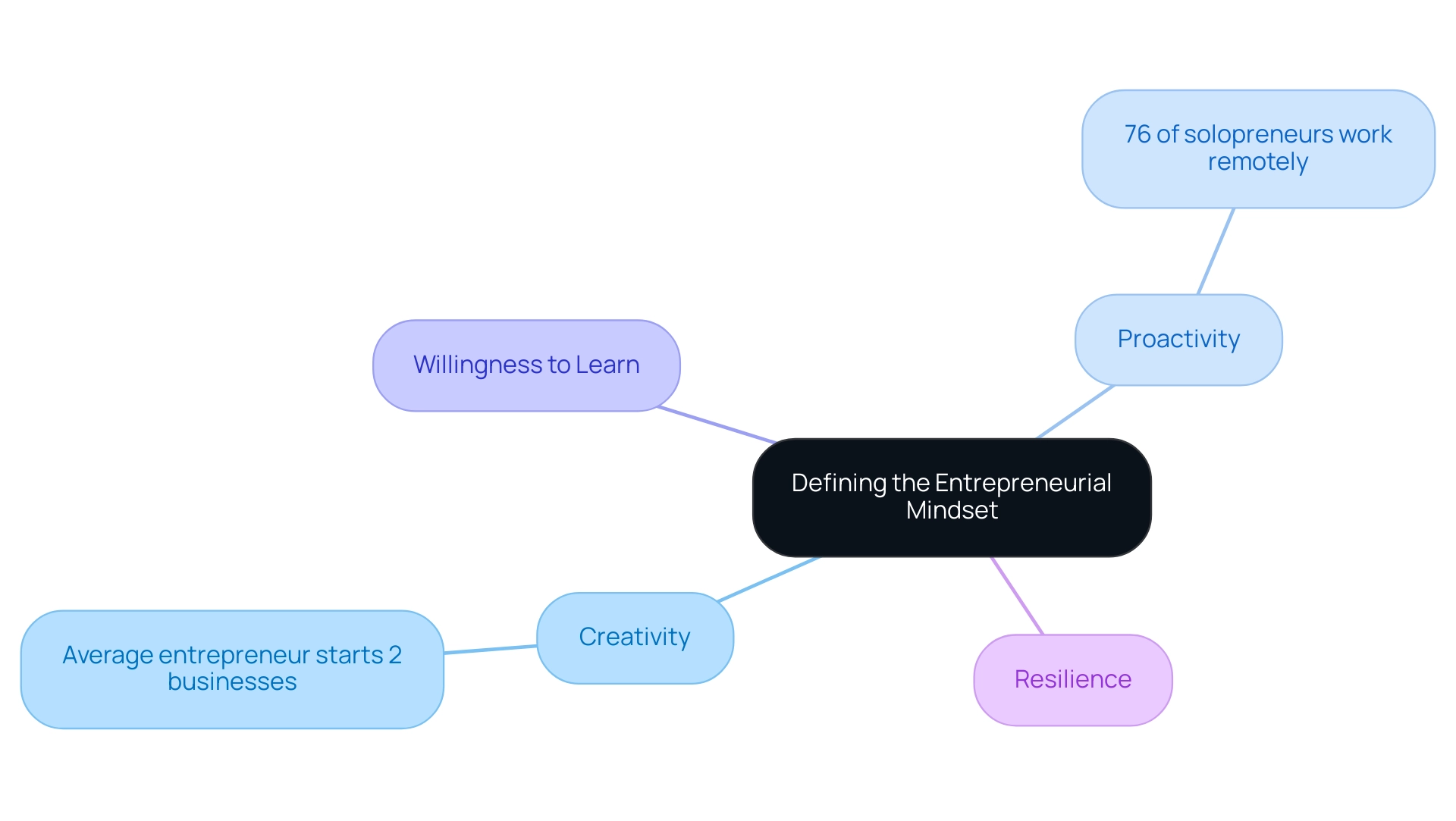
Essential Skills for Cultivating an Entrepreneurial Mindset
Cultivating an entrepreneurial attitude requires a deliberate focus on essential skills such as initiative, critical thinking, and adaptability. Initiative involves taking proactive steps toward your goals—it’s the driving force that compels you to act rather than wait. Critical thinking is vital in analyzing situations effectively, enabling informed decisions that can lead to successful outcomes.
In a rapidly changing business landscape, adaptability stands out as a crucial skill, empowering you to pivot in response to new challenges and opportunities, ensuring you remain relevant and effective.
In light of recent trends, where an alarming 84% of North American companies have reduced their headcount since the onset of the crisis, the urgency to be agile and resourceful in navigating the current job market cannot be overstated. This reality underscores the importance of taking steps to developing an entrepreneurial mindset, which equips individuals to respond effectively to this shifting landscape. As noted in ‘Your Career 2.0: A Survival Guide for The Battered Career Syndrome® and Investor Syndrome®,’ continuous learning and adaptation are essential for overcoming professional challenges and seizing opportunities.
To address the pressing question of employability duration, it is crucial to recognize that conventional job options are becoming increasingly limited, particularly for those facing age factor limitations. Therefore, taking control of your destiny through entrepreneurship becomes even more vital. This includes understanding how to fund your longer and active life expectancy, as well as recognizing that jobs today are often short-lived.
Interestingly, a significant finding from a study on education levels among entrepreneurs reveals that many do not possess a college degree; 31% found success with just an associate degree, while 30% thrived with a high school diploma.
This emphasizes that formal educational attainment is not a prerequisite for entrepreneurial success. Instead, honing skills like initiative and critical thinking are essential steps to developing an entrepreneurial mindset that can significantly enhance your ability to navigate the complexities of job transitions. Additionally, it’s noteworthy that women of color own half of all female-owned businesses in the U.S., showcasing the diversity and potential within entrepreneurship.
This strengthens the message that abilities and flexibility can result in success, irrespective of formal education.
To expedite your new profession and reduce risks, consider participating in ongoing skill enhancement and networking within your community. By leveraging your transferable skills and building a strong support network, you can create opportunities for yourself and ultimately achieve financial freedom and lifestyle fulfillment.
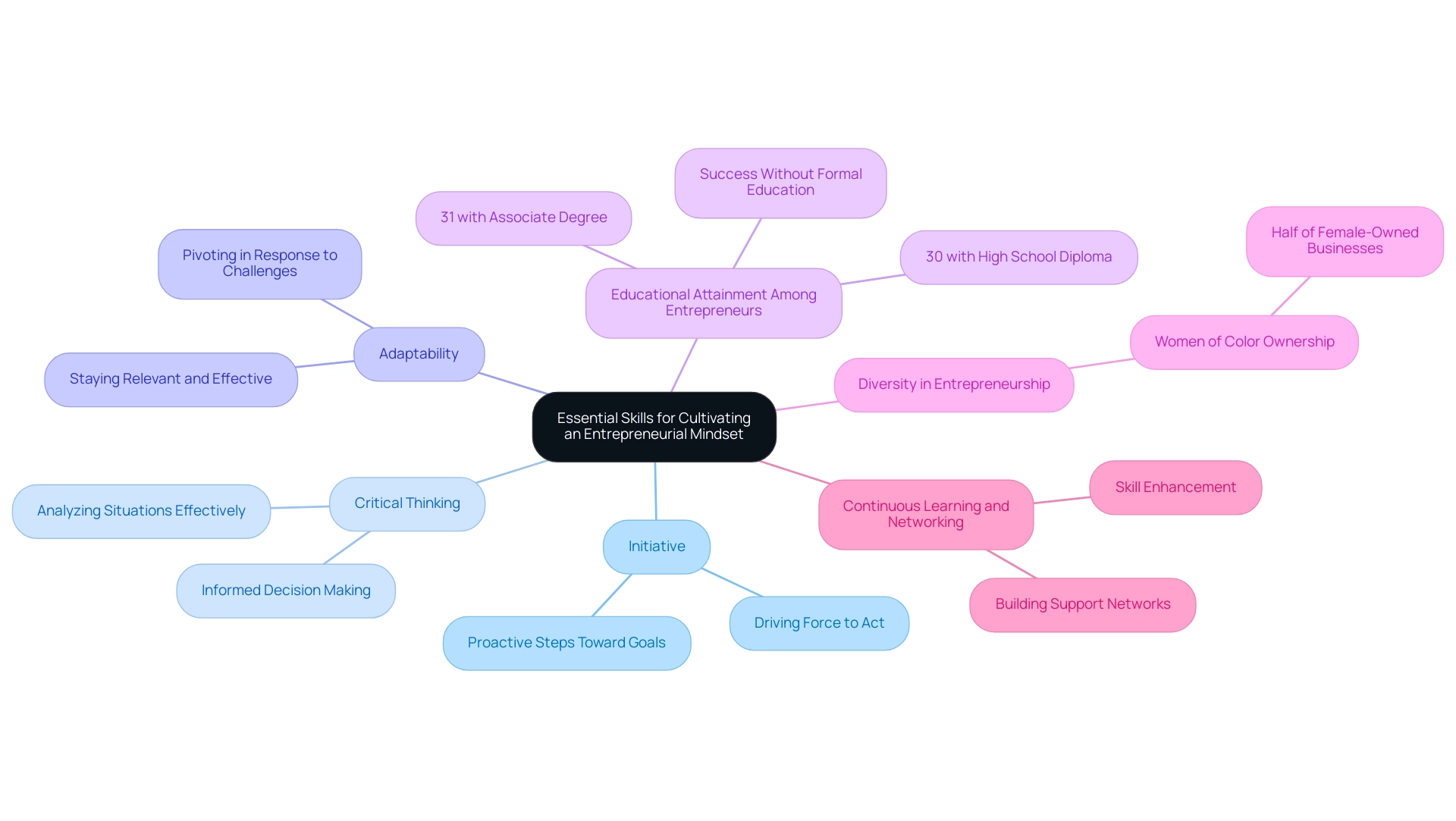
The Role of Goal-Setting and Strategic Planning
Goal-setting and strategic planning are essential steps to developing an entrepreneurial mindset, particularly for individuals navigating the complexities of professional transitions as emphasized in Your Career 2.0: A Survival Guide for The Battered Career Syndrome and Investor Syndrome. By establishing specific, measurable, achievable, relevant, and time-bound (SMART) goals, people can clarify their aspirations and construct a clear roadmap toward success. This approach is crucial in today’s challenging job market, where 80% of companies struggle to sever ties with unsuccessful projects, underlining the necessity of a methodical strategy.
Effective strategic planning involves outlining the steps to developing an entrepreneurial mindset, which includes:
- Identifying required resources
- Recognizing potential obstacles necessary to achieve these goals
A primary concern for many changing professions is income growth, which serves as a popular short-term goal; when income increases, it alleviates financial stress, allowing individuals to manage obligations like bills and home maintenance more effectively. It is noteworthy that 83% of companies advocate for the OKR framework to align organizational goals and enhance outcomes.
As Kiran Shahid, a content marketing specialist, emphasizes, ‘Setting clear goals not only drives focus but also fosters a culture of accountability and innovation within teams.’ Additionally, involving employees in goal-setting enhances commitment and innovation, making the process more collaborative and effective. A compelling case study demonstrates that students who commit their academic goals to paper—such as target grades or deadlines—often outperform their peers, showcasing the effectiveness of goal-setting in managing priorities and workloads.
This structured approach not only sharpens focus but also significantly boosts the likelihood of achieving desired outcomes during career transitions, thereby illustrating the profound impact of strategic planning and income growth on career success for aspiring entrepreneurs taking steps to developing an entrepreneurial mindset.
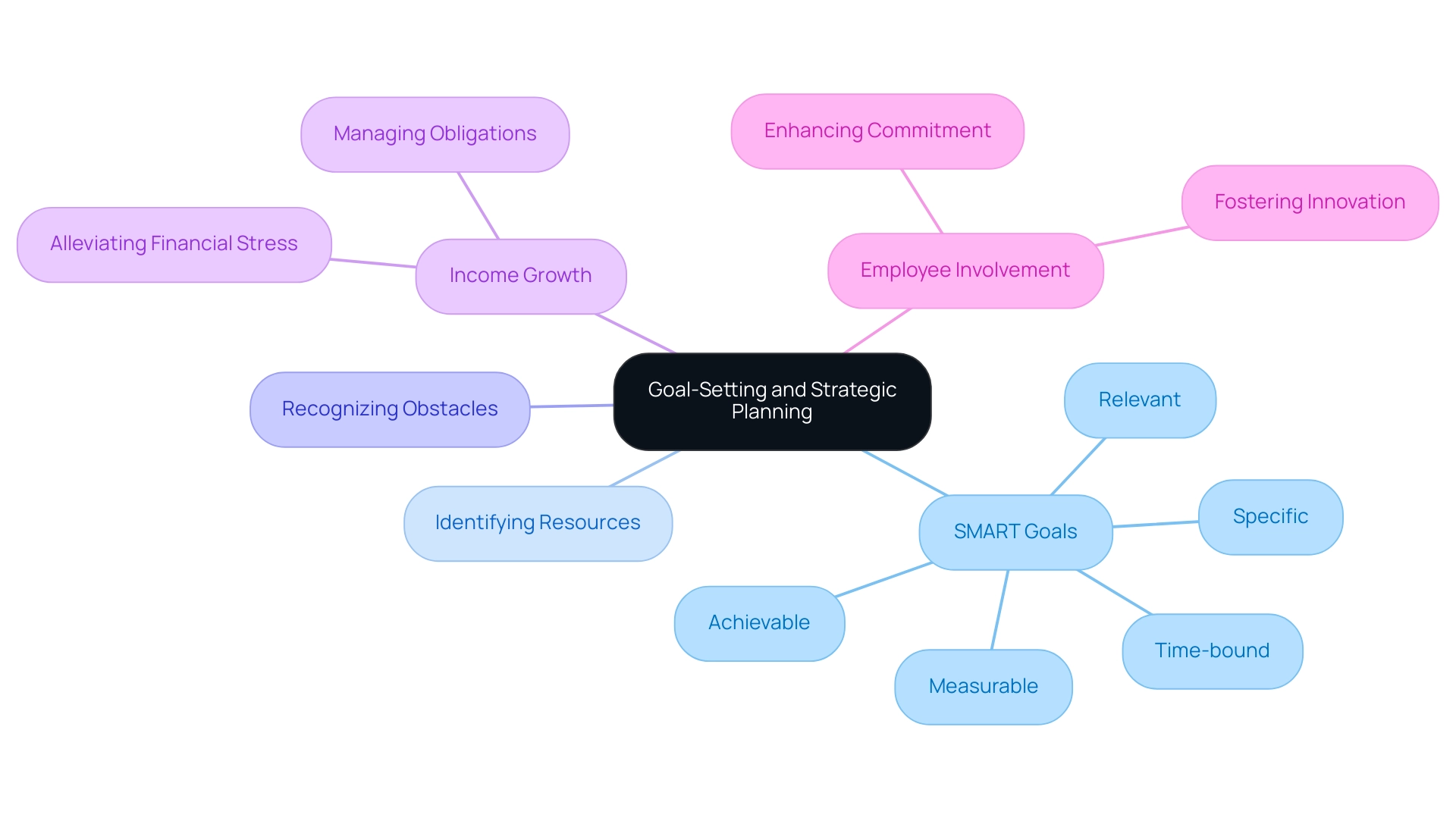
Embracing Resilience and Learning from Failure
Resilience and the capacity to learn from failure are pivotal steps to developing an entrepreneurial mindset, especially for those navigating the complexities of a declining job market. Entrepreneurs frequently encounter setbacks, but those who cultivate the ability to recover and adapt are often the ones who thrive. Embracing failure as a learning opportunity rather than viewing it as a setback allows people to refine their strategies and approaches, transforming challenges into stepping stones for success.
Recent data indicates a promising trend in entrepreneurship, with female entrepreneurs projected to rise by 10% in 2024, comprising 40% of all entrepreneurs globally. This shift underscores the growing need for robust support systems in entrepreneurship, as highlighted by Philip Salter from The Entrepreneurs Network, who states, ‘For ecosystem builders, this research emphasizes the urgent need to integrate support into entrepreneurship programs.’ This insight is crucial for aspiring entrepreneurs and career transitioners alike, as learning from setbacks not only fosters resilience but also enhances confidence in pursuing personal satisfaction and purpose.
Entrepreneurs seek autonomy and flexibility, focusing on their passions and the impact they wish to create rather than solely on financial gain. Each challenge faced along the way is an opportunity for growth, emphasizing that the steps to developing an entrepreneurial mindset involve not just enduring failure but leveraging it to propel oneself forward. Moreover, grasping the various categories of entrepreneurship—like Small Business, Scalable Startup, Large Company, and Social Entrepreneurship—offers a thorough perspective on how resilience functions across diverse entrepreneurial environments, enabling people to reshape their personal and professional goals in the process.
To support this journey, ‘Your Career 2.0: A Survival Guide for The Battered Career Syndrome and Investor Syndrome’ serves as an essential resource, offering insights and strategies tailored to those facing the challenges of both Battered Career Syndrome and Investor Syndrome.
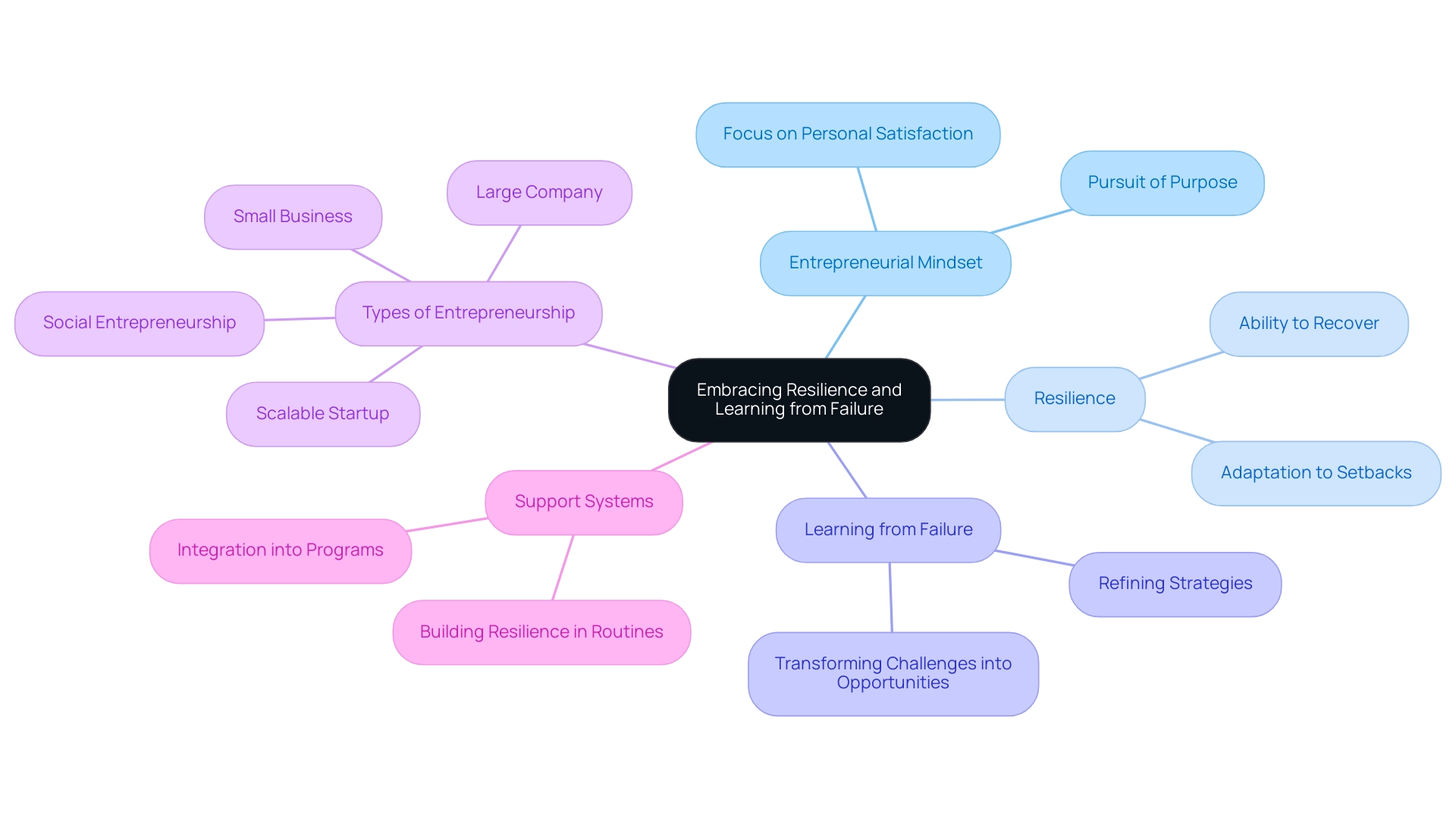
Networking and Collaboration: Keys to Entrepreneurial Success
Networking and collaboration are essential cornerstones for entrepreneurial success, particularly in today’s rapidly changing business landscape. For those changing professions, a strong professional network is not merely a luxury; it is an invaluable resource that links people to mentors, peers, and potential collaborators who can offer essential support and guidance as they face employability challenges. Recent trends reveal that 66.5% of event professionals are embracing hybrid formats, with 38.8% of organizers hosting satellite events alongside major B2B conferences, illustrating the evolving nature of networking opportunities.
Entrepreneurs must actively engage in both in-person and virtual settings to broaden their reach and discover new avenues for financial independence. Additionally, collaborative projects can unveil insights that are vital for the steps to developing an entrepreneurial mindset. By fostering relationships at industry conferences, online communities, and platforms like GitHub or data science blogs, transitioners can access resources that enhance their journey towards personal fulfillment.
As Gillian Kerr highlights, authentic networking is crucial for building trust and a strong brand identity, reinforcing the notion that collaboration is key to personal growth. Furthermore, the statistic that 56% of workers would share a positive job application experience underscores how effective networking can significantly boost one’s reputation and open doors to new paths. Embracing collaboration not only accelerates personal growth but can also lead to successful initiatives that advance opportunities, ultimately empowering individuals to take control of their destinies.
To further support your journey, download your free Veteran Entrepreneur® Program presentation here, which offers valuable insights into overcoming the unique challenges of a declining career economy and leveraging your network to fast-track your new career.
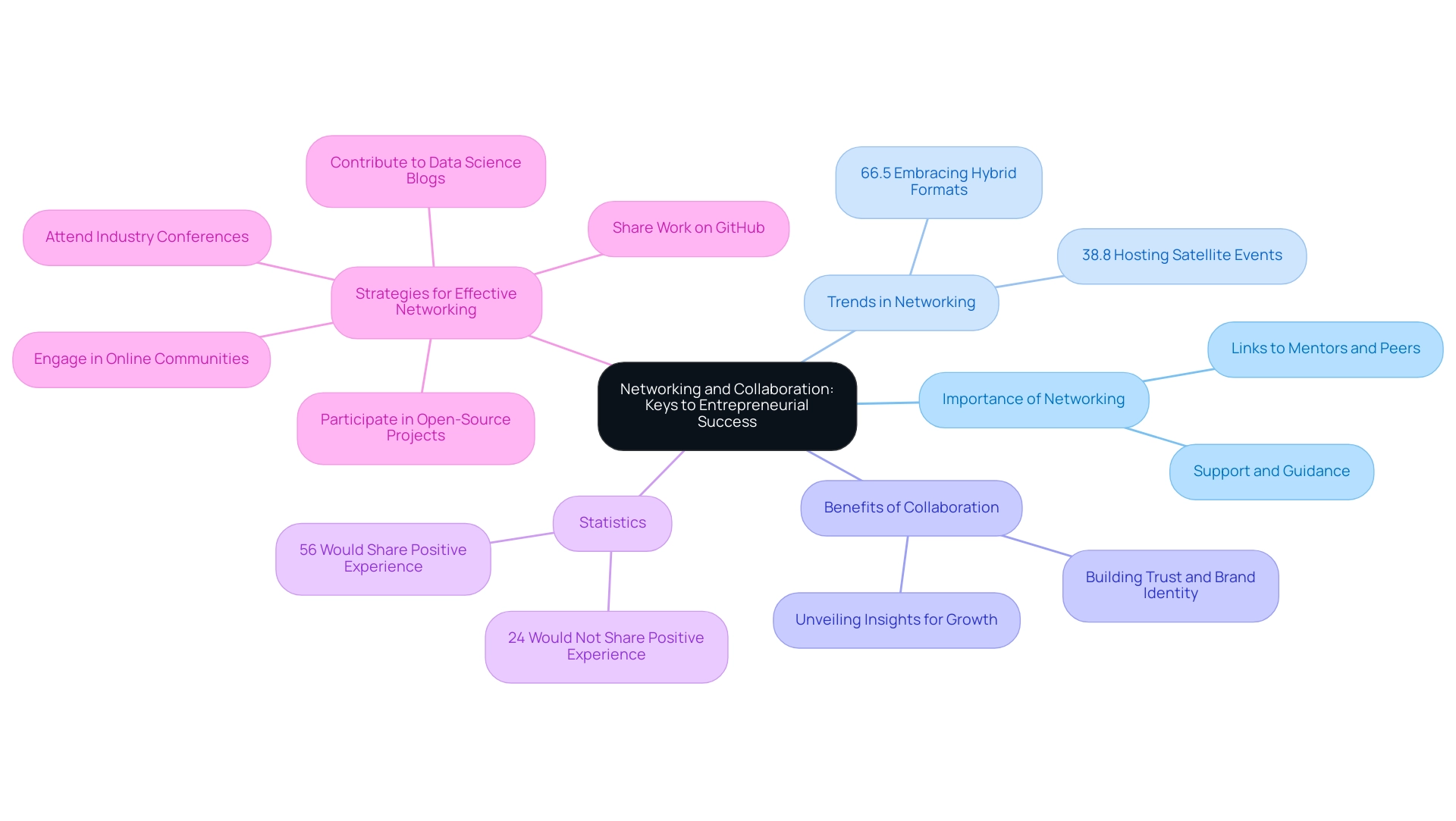
Conclusion
Cultivating an entrepreneurial mindset is essential for navigating the complexities of today’s unpredictable career landscape. By embracing key components such as essential skills, goal-setting, resilience, and networking, individuals can position themselves for success in diverse industries. The emphasis on initiative, critical thinking, and adaptability not only enhances employability but also empowers individuals to take charge of their career paths, especially in a job market characterized by rapid change.
Strategic planning and the establishment of SMART goals serve as vital tools in charting a clear course through career transitions. By setting specific objectives and preparing for potential obstacles, individuals can alleviate financial stress and create a roadmap to achieve their aspirations. Moreover, resilience and the ability to learn from failure are crucial, as they transform setbacks into opportunities for growth, fostering a mindset that thrives on challenges rather than succumbing to them.
Finally, the importance of networking and collaboration cannot be overstated. Building a robust professional network opens doors to mentorship, resources, and collaborative opportunities that can significantly enhance one’s career trajectory. By actively engaging in both in-person and virtual networking, individuals can access invaluable support systems that fuel personal and professional growth.
In summary, adopting an entrepreneurial mindset is not merely beneficial; it is a strategic necessity for those undergoing career transitions. By focusing on skill development, setting clear goals, embracing resilience, and leveraging the power of networking, individuals can navigate the evolving job market with confidence and purpose, ultimately paving the way for lasting success and fulfillment.


